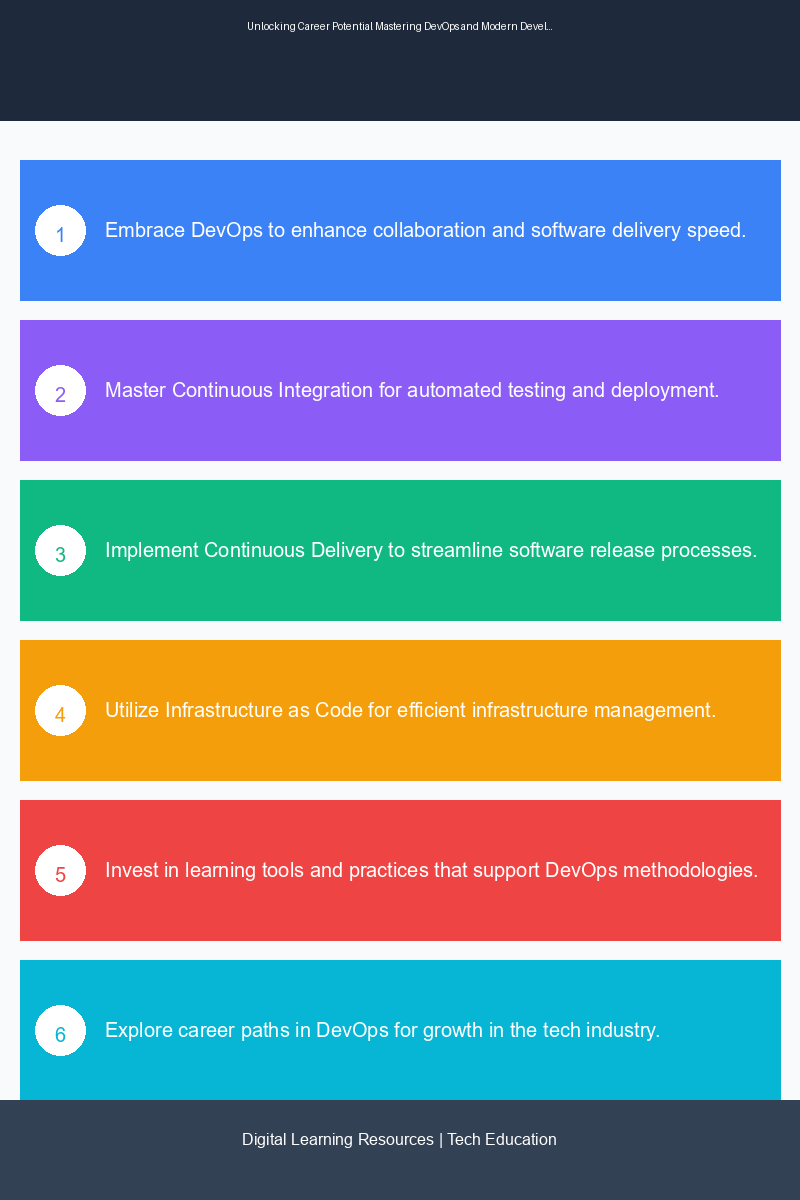Key Takeaways: Discover the power of DevOps in enhancing your software development practices. Learn about Continuous Integration, Continuous Delivery, Infrastructure as Code, and more. Explore career opportunities and the essential skills needed to thrive in the tech industry.
Introduction
In today’s fast-paced digital landscape, the demand for skilled IT professionals is at an all-time high. The rise of DevOps—a set of practices and methodologies aimed at unifying software development and operations—has revolutionized how teams collaborate and deliver software. In this blog post, we will delve into key technical concepts, practical applications, educational pathways, and the impact of DevOps on your career development. Whether you are an aspiring developer, a seasoned IT professional, or a tech learner, this guide will serve as your roadmap to mastering modern development practices.
Technical Background and Context
As the tech industry evolves, embracing DevOps practices becomes essential for achieving faster software delivery and a more efficient development lifecycle. Below are critical technical concepts that form the backbone of DevOps:
📚 Recommended Digital Learning Resources
Take your skills to the next level with these curated digital products:
AI Enhanced Resume Builder
AI Resume Builder Flask App – Complete Source Code + PDF Tutorial + HTML | Digital Download for Designers
Learn AWS: Your First Cloud Application
Learn AWS: Your First Cloud Application
📊 Key Learning Points Infographic

Visual summary of key concepts and actionable insights
Comprehensive SAT Prep: 470+ Vocabulary Words
Comprehensive SAT Prep: 470+ Vocabulary Words
Master DevOps in Practice – 50 Essential Topics for Engineers (PDF eBook)
Master DevOps in Practice – 50 Essential Topics for Engineers (PDF eBook)
The Ultimate Keyboard Shortcut Guide 49 Software Cheat Sheets in One PDF Bundle
The Ultimate Keyboard Shortcut Guide 49 Software Cheat Sheets in One PDF Bundle
- DevOps: A cultural shift that emphasizes collaboration between development and operations teams, fostering a more agile and efficient workflow.
- Continuous Integration (CI): A practice where code changes are frequently merged into a shared repository, allowing teams to detect errors quickly and improve software quality.
- Continuous Delivery (CD): Enabling software to be released to production at any time, CD ensures that the software is always in a deployable state.
- Infrastructure as Code (IaC): Automating the provisioning and management of infrastructure using machine-readable configuration files, enhancing reliability and scalability.
- DevSecOps: Integrating security into the DevOps process from the start to reduce vulnerabilities and ensure compliance.
- Serverless Computing: A cloud model where the cloud provider automatically manages the infrastructure, allowing developers to focus solely on code.
- Microservice Architecture: Designing applications as a collection of loosely coupled services enables greater scalability and easier maintenance.
- AIOps: Utilizing artificial intelligence to optimize IT operations, AIOps helps in identifying patterns and automating routine tasks.
Practical Applications and Use Cases
Implementing DevOps practices can transform how teams deliver software. Here are some practical applications and use cases:
- Faster Time to Market: By adopting CI/CD pipelines, organizations can reduce the time it takes to release new features and updates, allowing them to respond to market demands swiftly.
- Increased Collaboration: DevOps fosters a culture of collaboration between development, operations, and security teams, breaking down silos and improving communication.
- Improved Quality and Reliability: Automated testing and monitoring tools in CI/CD help ensure that only high-quality code reaches production, reducing the risk of failures.
- Scalability with Microservices: Companies can scale their applications more efficiently by using microservice architecture, allowing individual services to be developed and deployed independently.
Learning Path Recommendations
To thrive in the ever-evolving tech landscape, consider the following learning paths that focus on essential DevOps skills and practices:
- Foundational Knowledge: Start with courses that cover the basics of DevOps, version control systems (like Git), and CI/CD tools (such as Jenkins, GitLab CI, or CircleCI).
- Advanced Topics: Progress to learning Infrastructure as Code with tools like Terraform or AWS CloudFormation, and delve into containerization with Docker and orchestration with Kubernetes.
- Security Practices: Explore DevSecOps principles and tools such as Snyk or Aqua Security to integrate security into your development processes.
- Certifications: Pursue relevant certifications like AWS Certified DevOps Engineer, Docker Certified Associate, or the Certified Kubernetes Administrator (CKA) to validate your skills.
Industry Impact and Career Implications
The impact of DevOps on the industry cannot be overstated. Organizations are increasingly adopting DevOps practices to streamline development and improve operational efficiency. The implications for your career are significant:
- High Demand for Skills: As companies continue to embrace DevOps, the demand for professionals skilled in CI/CD, IaC, and collaborative practices is skyrocketing.
- Career Advancement: Mastering DevOps methodologies can lead to higher-paying positions, including roles like DevOps Engineer, Site Reliability Engineer (SRE), and Cloud Architect.
- Versatile Skill Set: The skills you gain in DevOps can be transferable across various roles in software development, operations, and security, enhancing your employability.
Implementation Tips and Best Practices
Successfully implementing DevOps practices requires a strategic approach. Here are some best practices to consider:
- Start Small: Begin your DevOps journey with small projects to understand the workflow before scaling to larger applications.
- Automate Where Possible: Use automation tools for testing, deployment, and monitoring to increase efficiency and reduce human error.
- Foster a Collaborative Culture: Encourage open communication and collaboration between development, operations, and security teams to break down silos.
- Measure Outcomes: Regularly assess the success of your DevOps practices through metrics such as deployment frequency, lead time for changes, and mean time to recovery (MTTR).
Future Trends and Skill Requirements
The landscape of DevOps and software development is continuously evolving. Here are some trends to watch and skills to develop:
- Increased Automation: The future will see more reliance on AI and machine learning to automate complex tasks within the DevOps pipeline, enhancing efficiency.
- Focus on Security: With the rise of cyber threats, integrating security seamlessly into the development process will become more critical.
- Hybrid and Multi-Cloud Strategies: Organizations are likely to adopt hybrid cloud environments, necessitating skills in managing and deploying applications across multiple cloud platforms.
Conclusion with Actionable Next Steps
As you embark on your journey to mastering DevOps, remember that continuous learning and adaptability are key. Start by exploring the recommended learning paths and certifications, engage with the community, and practice your skills through real-world projects. By embracing DevOps practices, you not only enhance your technical capabilities but also position yourself for exciting career opportunities in the tech industry. Here are your next steps:
- Enroll in an online course focused on DevOps fundamentals.
- Join a local or online tech community to network with professionals in the field.
- Begin a personal project where you can apply CI/CD and IaC principles.
- Stay updated on industry trends and tools by following relevant blogs and attending webinars.
By taking these steps, you will be well on your way to not only understanding but also excelling in the world of DevOps and modern software development.
Disclaimer: The information in this article has been gathered from various reputed sources in the public domain. While we strive for accuracy, readers are advised to verify information independently and consult with professionals for specific technical implementations.
Ready to advance your tech career? Explore our digital learning resources including programming guides, certification prep materials, and productivity tools designed by industry experts.



